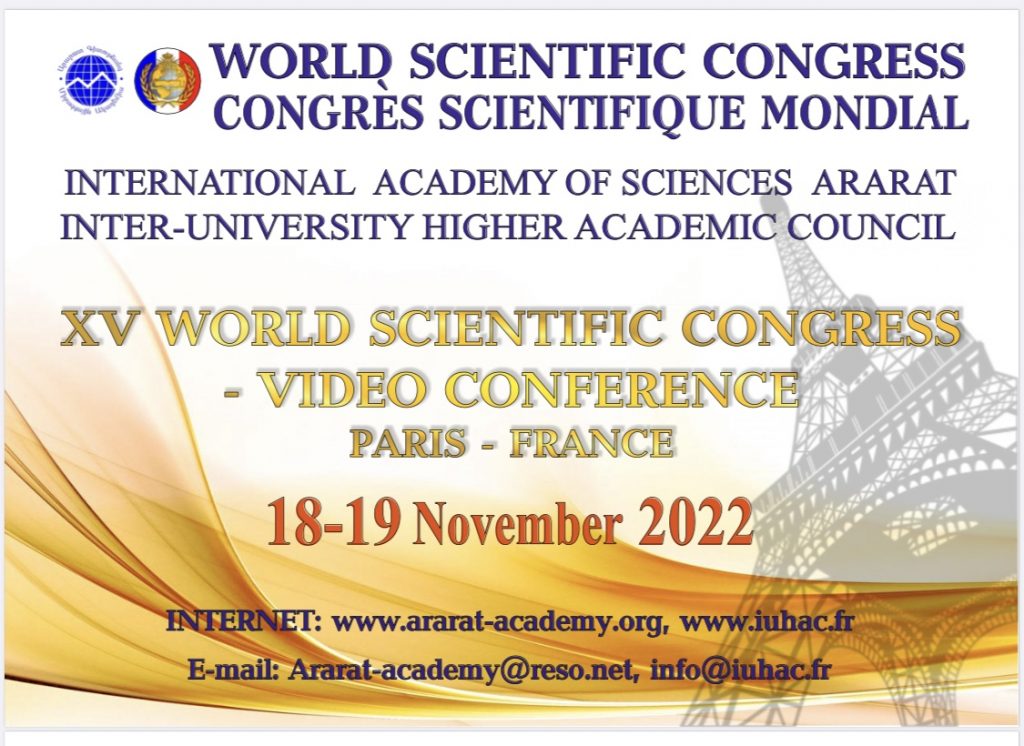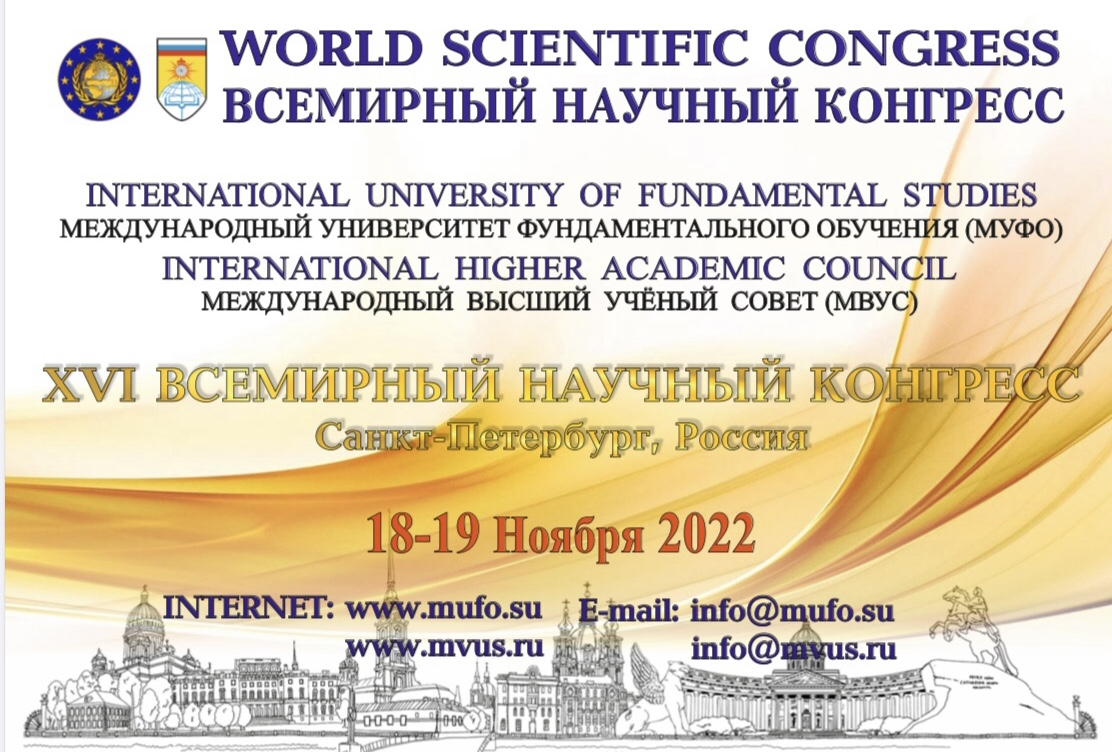PROGRAMME
XVI WORLD SCIENTIFIC CONGRESS -2022
November 18 and 19, 2022
Saint-Petersburg (Russia)
“MODERN SCIENCE: CONCEIVING AND IMPLEMENTING.”
Organizers:
International University of Fundamental Studies (IUFS)
International Higher Academic Council , Russia
The XVI World Scientific Congress will be held on November 18–19, 2022 in St. Petersburg in the format of an online video conference.
Venue:
195067, Russia, St. Petersburg,
27 Marshala Tukhachevsky St.
(16th floor, Karelia Hotel, Congress Hall)
9:30 a.m. – Start of registration of participants of the XVI Congress.
10:00 a.m. – The Congress begins.
The hours of operation are 10:00 a.m. to 6:00 p.m.
Welcome speech:
The President of the Congress, Rector of the International University of Fundamental Studies, President of the Intergovernmental Academic Council (IUSC), Professor Santhi Pushpa Kumara Jayasekera (Russia/Russia).
The purpose of the Congress is to find solutions to problems arising in connection with the rapid development of science and technology, the widespread introduction of new technologies that affect the fate of humanity from a global perspective.
Today, people around the world are concerned about the crisis. After the long boom of the past decades, which has been called the “golden age of the world economy,” the first deep crisis of the globalization era has struck.
Today, as never before, it has become clear that humanity has deviated greatly from the natural path of its development, and the main reason for this imbalance in the relationship between the human population and the environment has been official science, purged of moral criteria and fragmented into many special directions, quite distant from the real problems of today. However, these problems are systemic in nature and affect primarily the holistic human worldview, i.e., if we take a broader view, the whole complex of interactions between the natural sciences and the humanities. It is no longer possible to address fundamental issues on a global scale by relying solely on the traditional basic sciences, i.e., physics alone, chemistry alone, biology alone, or mathematics alone.
Nowadays, just as thousands of years ago, scientific activity is based on trial and error, the essence of which lies in successively proposing and considering all sorts of ideas and looking for ways to implement them. Every time an unsuccessful idea is discarded, a new one is put forward in its place. There are no rules of search: any idea, even the “wildest” one, may be the key to the solution. There are no specific rules for the initial evaluation of ideas: whether it is suitable or not, whether it is worth checking or not – you have to judge it subjectively.
Once upon a time, problem solutions were chosen literally at random. But as technical knowledge evolved, ideas emerged about what was possible in principle and what was impossible. In accordance with these notions, the modern scientist filters the options, discarding what seems unsuccessful. Increasing the degree of filtering is the main trend in the historical development of the trial-and-error method. Filtering makes it easier to solve problems that have normal, i.e., more or less habitual, answers, and it makes it very difficult to solve problems that require non-trivial, “wild” ideas.
Another trend in the development of the trial-and-error method is the replacement of real experiments by mental experiments. The amount of knowledge available to the modern inventor is so great that the results of many trials can be predicted in advance.
All this makes it possible to theorize most of the options without resorting to real, physical experiments. Mental experiments are much faster, and that is their main advantage. But since mental experiments are subjective, they are not immune to psychological interference. Besides, mental experiments, unlike real experiments, as a rule, are not accompanied by unexpected side discoveries, the detection of all kinds of unforeseen phenomena and effects.
The XVII WORLD SCIENCE CONGRESS will be devoted to in-depth analysis and comprehension of these problems.
If you have any inquiries please do not hesitate to contact the Chief coordinator of the XVII World Scientific Congress and the head of Sri Lankan delegation Prof.J.S.K.Jayasekara, Vice-chancellor of IUFS university, on or before 05th of November 2022.
LIST OF CONGRESS PARTICIPANTS
November 18 from 10:00 a.m.
Prof. Jayasekera Santi Pushpa Kumara
Prof. Andrey M. Jesuitov
Prof. Vitaly Vitalyevich Lukoyanov, Chairman of the Board, at the congress. Lukoyanov Victor Vitalievich
Prof. V.V. Lukoyanov Prof. V.V. Prof. Subetto Alexander Ivanovich
Prof. Albert Ivanovich Krashenyuk
Dr. Jayasekara Milan Diné
Prof. Yuri Viktorovich Galtsev Yuriy Viktorovich Galtsev
Prof. Evgeniy Ismailovich Borovkov
Prof. Victor Vasilievich PoSemikin
Dr. Alexander Platitsyn
Prof. Yevgeny Protopopov Prof. Yevgeny Nikolaevich Protopopov Evgeny Nikolaevich
Prof. Noviya Anna Aleksandrovna Prof.
Prof. Kuzmenko Olga Petrovna Prof.
Prof. Molchanova Elena V.
Prof. Slesarev, Valery Ivanovich
Prof. Chabanov Vladimir Yemelyanovich
Prof. Maykova Nina Ivanovna
Prof. Potemkina Larisa Vladimovna
Prof. Katanskiy Sergey Anatolievich
Prof. Silov Anatoly Alexandrovich
Prof. Bondarenko Valentina Grigorievna
Prof. Zainullin Evgeny Gabdulovich
Samorodnov Oleg Wilhelmovich
Dr. Evgeny Vyacheslavovich Komrakov, Ph.
Prof. Luchkevich Vladimir Stanislavovich
Prof. Lihktin Anatoly
Prof. Hwang Sang Keun
Prof. Dr. Yevgeniy Komrakov, MD, PhD. Borislav Arkadievich Michalevich Prof.
Prof. Zinaida Grigorievna Simonenko Zinaida Grigorievna Simonenko Prof.
Prof. Abaev Sultan Shamsutdinovich
Dr. Solomonashvili Besik Laursabovich
Prof. Ryazantsev Alexandr Nikolaevich Prof.
Prof. Dr. Alexander Ryazantsev, Prof. Dr. Anna Fedorovitch. Anna Fedorovna Prof. Dr. Savchuk
Master Shevkunov Vladislav Sergeyevich
Prof. Baluta Sergey Alexandrovich
Prof. Boris A. Semenov
Trubacheva Olga Matveevna
Prof. David Solomonovich Kvirkvelia
November 18 from 10:00
Prof. Yury Safeliev
Prof. Sergey Yurievich Tolsky
Dr. Yuriy Yurievich Magas-Ilyushenko
Prof. Bresso Tatyana Ivanovna
Prof. Kovalenko Natalia Petrovna
Prof. Dubovsky Leonid Yakovlevich
Prof. Solodovnikova Elena Sergeevna
Prof. Koshurko Alexander Nikolaevich
Prof. Valentin Alexandrovich Gavrilov
Dr. Tokazhevskaya Margarita Leontyevna
Prof. J. Kozhazharov Zhanat Mukhametov Prof. Kozhamzharov Zhanat Mukhametkalievich
Dr. Teplykh Sergey Alexandrovich
Prof. Dr. Tatyana Vointseva Vointseva Tatyana Vladimirovna
Dr. Pukhov Igor Anatolievich
Prof. Teryoshkin Sergey Alexandrovich
Prof. Shakhmardanov Sharif Shakhmardanovich
Unksov Nikita Vasilievich
Gruzdev Vladimir Nikolaevich
Prof. Dina Yur. Dina Yurievna Elistratova
Dr. Darmograi Nikolay Vasilievich.
Prof. Soldatenkov Aleksei Yurievich
Dr. Saveliev Mikhail Viktorovich
Prof. Jan Alam, Prof.
Prof. Loosan Arman
Prof. Trifa Sadihk
Prof. Juknevicius Valdes Alubavicius
Prof. Vlaluchenko Vladimir
Prof. Dr. Valdes Alubavicius Prof. Peisahovich Yuri Iosifovich
Prof. Gorobets Adeksandr Grigorievich
Master Tretiakov Eduard Vadimovich
Prof. Goma Svetlana Evgenyevgenovich Goma Svetlana Evgenievna
Magomed Magomedsaidovich Osmanov
Prof. Evgeny Vyacheslavovich Komrakov
Alexander Aleksandrovich Gruzov
Lukoyanova Anna Borisovna
Tatiana Alexandrovna Vinogradova
Inna Tochilova
Boris Blankov
Solovyov Andrey Nikolaevich
Dr. Said Marok Aswad
Eva Tusari Jayasekera
Anna Lukoyanova

ONLINE VIDEO CONFERENCE IN PARIS
